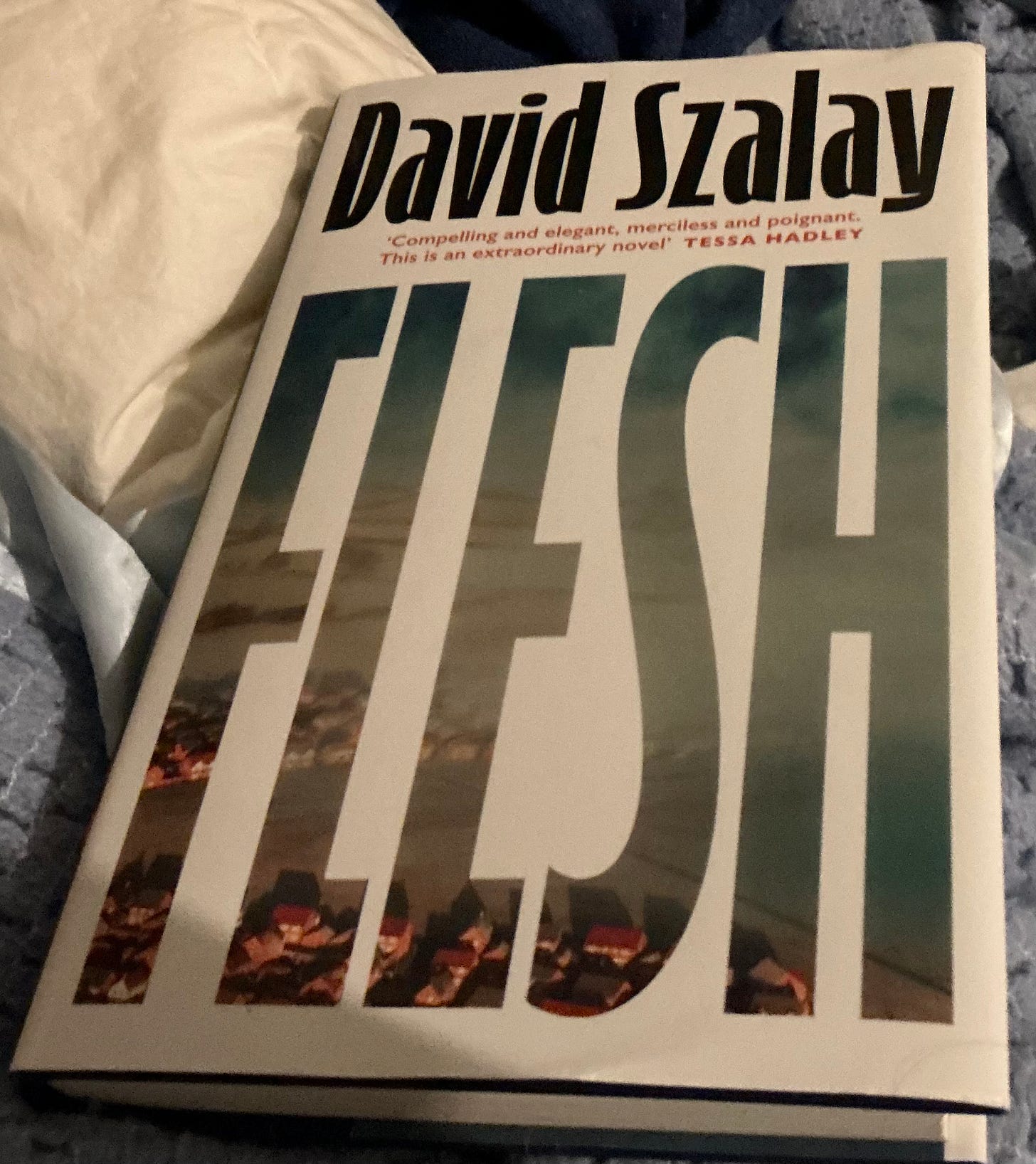I first came across David Szalay’s writing in early 2011, when I read his third novel, Spring. I loved it so much I pleaded with my lit ed at the Independent on Sunday to review it, and being a kind and open person, she allowed me the longest review slot that week: https://www.independent.co.uk/arts-entertainment/books/reviews/spring-by-david-szalay-2233421.html
Szalay’s talent had already been recognised - his first novel, 2009’s London and the South-East, won the Betty Trask Award and the Geoffrey Faber Memorial Prize. Then in 2013 Szalay was named as one of Granta’s list of best young British novelists, and his 2016 novel All That Man Is was shortlisted for the Man Booker and won the Gordon Burn Prize.
His 2018 book Turbulence was commissioned by BBC radio 4 as a series of 15 minute linked stories. For this reason, Szalay restricted himself to 2000 words for each story. Szalay says that this caused him to write in a very concise way. That spare, economical style is evident in Flesh: reading it, I was reminded of M.J. Hyland’s sparse style and her ethos ‘let every word work for its place.’
The frugality of the language matches the monosyllabic social awkwardness of the protagonist, Istvan, who we first meet as a fifteen year-old Hungarian boy who has recently moved to a new town with his mother and is finding it difficult to make friends. It isn’t difficult to see why: in the competitive clamour of school, those who remain silent tend to be ignored by their peers. Istvan isn’t exactly shy, he seems more like someone who doesn’t see the point of talking for its sake. Incurious and passive, from the start he is the kind of person to whom things happen. He simply stands there like a rock and allows the waves of the world to wash over him.
But lacking eloquence doesn’t mean Istvan doesn’t feel emotions. On the contrary, because he hasn’t ever been the kind to discuss feelings with others, when he does feel strongly, he is sometimes confused or overwhelmed, or responds physically, which makes it even less likely that others will talk to him about intimate matters.
The story follows Istvan’s life over the next few decades. In that respect, and in one important other, it has similarities with Ian McEwan’s last novel, Lessons, which also followed the life of a boy through youth to middle age. The ‘important other’ is an act of exploitation that is common to the boy in both novels. McEwan’s protagonist is a small child when this violation occurs, Szalay’s is a 15 year-old. With the latter being nearer adulthood, the act seems less heinous, less shocking, but the extent to which it can still affect a teenager should not be underestimated. In both novels the long lasting effects are largely invisible to others but still palpable. In Flesh, however, they give rise to an immediate event which changes the course of Istvan’s young life. Who knows how else such events colour lives - scars on the soul are often unseen even by the person themselves.
In Flesh, much of the action takes place away from the pages. The gaps are filled in for us. This sometimes gives the sense of the novel skimming through Istvan’s life, focusing only on the parts Szalay wants to, with other important events merely referred to in speech. It has a distancing effect, so that we are initially not fully immersed in or invested in Istvan’s life, something exacerbated by his inability to articulate his thoughts. So we jump from Istvan aged 15 to him several years later, and then again to him after Hungary has joined the EU and freedom of movement allows Istvan to have moved to London.
He starts off working low paid security jobs in the UK capital but by a turn of fate, lands on his feet. This incident and subsequent developments are described, but oddly, once Istvan moves job, the very close and nurturing new friendship between Istvan and the man who makes these opportunities possible seems to drop off, or at least, we hear nothing else about the man or the friendship. It’s as if we are only told about relationships that directly influence the course of the story, rather than the incidentals that enrichen a life - the friendships, hobbies, passions, new experiences, food, even the everyday problems, like medical issues. It’s one of the ways in which the brevity of touch mitigates against our investing in the story. In a way, it’s a bit like reading a diary as opposed to feeling as if we are sharing a life lived, because we are not privy to the details of his life, we only hear selected extracts. And yet, we continue to care. Istvan is not a modern or even a very thinking sort of man, but his welfare was important to me, and although he was inchoate and/or elusive, he was all the more real because of his flaws. I read the book in one day, unable to put it down.



